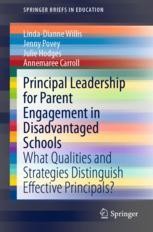 Griffith Institute for Educational Research member Dr Linda Willis and colleagues, Associate Professor Jenny Povey, Dr Julie Hodges and Professor Annemaree Carroll have published their new book, Principal leadership for parent engagement in disadvantaged schools: What qualities and strategies distinguish effective principals?
Griffith Institute for Educational Research member Dr Linda Willis and colleagues, Associate Professor Jenny Povey, Dr Julie Hodges and Professor Annemaree Carroll have published their new book, Principal leadership for parent engagement in disadvantaged schools: What qualities and strategies distinguish effective principals?
The book draws on findings of a 2016 research project that was supported by the Queensland Department of Education, as part of the Education Horizon grant scheme. The focus of this research was to examine the practices and strategies of four principals who were considered successful in parent engagement. In particular, investigating the critical role school principals play in engaging parents and their school communities to enhance student learning and wellbeing.
Dr Willis said,
“The weight of research evidence over the last half century about the benefits of parent engagement has seen this aspect of education become more central to the work of schools and principals.
This has created a shift in focus from merely involving parents in traditional school and classroom activities such as volunteering at the tuckshop to considering ways schools might ‘narrow the gap’ between parents and what and how their child is learning.”
The translation of practice to theory and theory to practice is a strong feature of this book.
Dr Willis said,
“The book draws on and extends previous research, to present a comprehensive analytic framework around the notion of commonplaces in planning the curriculum which probes eight dimensions where students learn.
We theorise the findings using the concept of agency as achievement which looks at how past, future and present orientations worked together to inform the principals’ parent engagement choices and decisions.”
The eight dimensions where students learn were categorised into three groups. These are:
- Key Players: students, parents, and teachers
- School Learning: classrooms, curriculum (subject matter), and digital technologies (virtual classrooms)
- School Culture: schools and communities.
The researchers found that the principals who are successful in engaging parents understood the importance of being futures-focused.
Dr Willis said,
“The principals understood that relationships and initiatives developed in the present built agency for achieving concrete outcomes for engaging parents in student learning and wellbeing in the future.”
A futures-focused perspective included the use of strategies that:
- encouraged cultural acceptance,
- valued and celebrated diversity, and
- engendered hope and pride.
The principals also demonstrated the importance of a number of qualities that facilitated parental engagement. Dr Willis identified these qualities as:
- the capacity for self-reflection,
- self-knowledge,
- empathy,
- intentionality,
- sustained commitment, and
- innovation.
The findings highlight the importance of harnessing student agency, creating channels for reciprocal communication between home and school, using digital technologies to bridge school and home learning, and adopting universal practices in schools to enhance parent engagement.
The book is available through SpringerBriefs in Education.
Subscribe to the GIER Insights blog to stay informed about research and events at the Institute.


